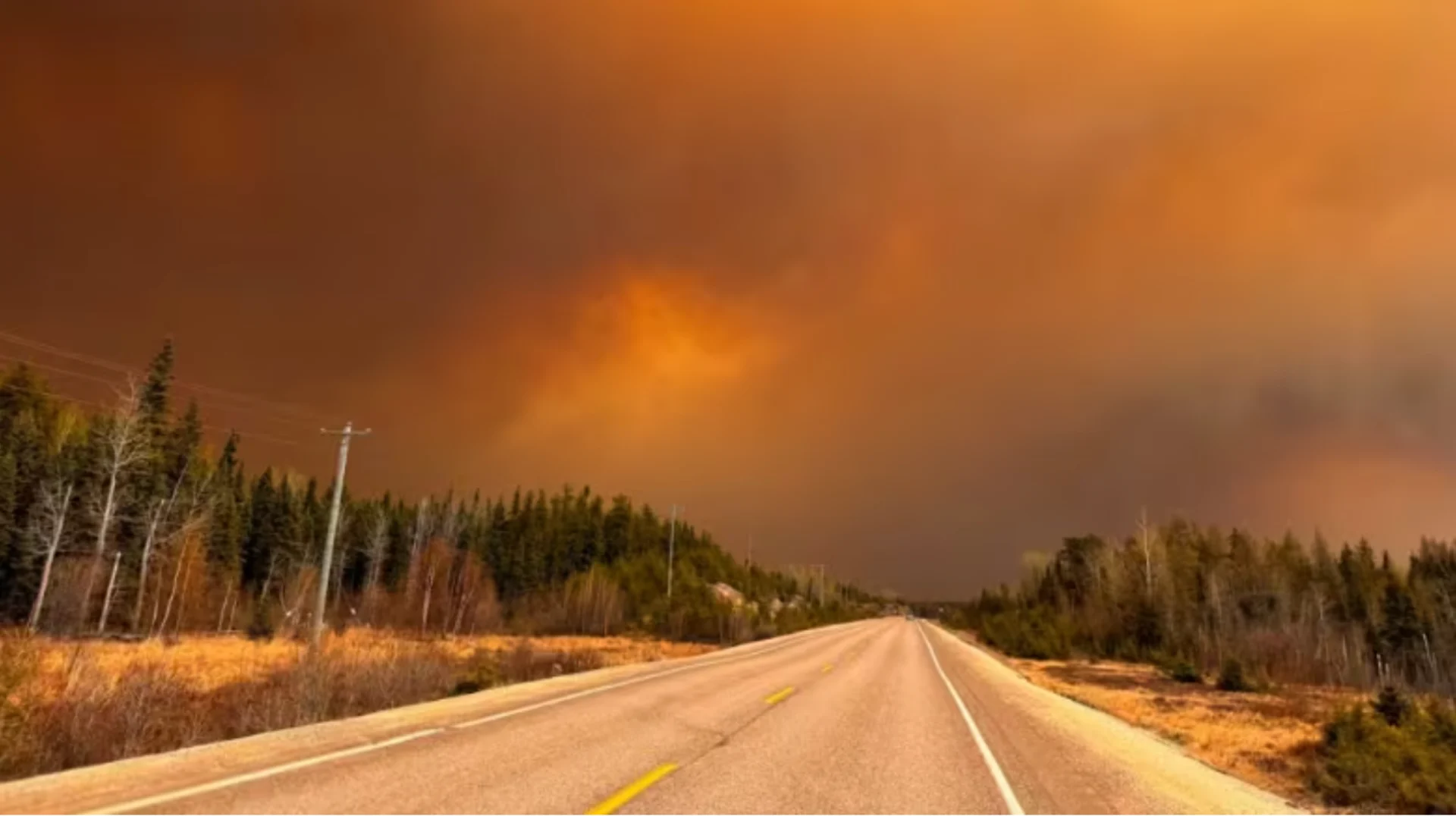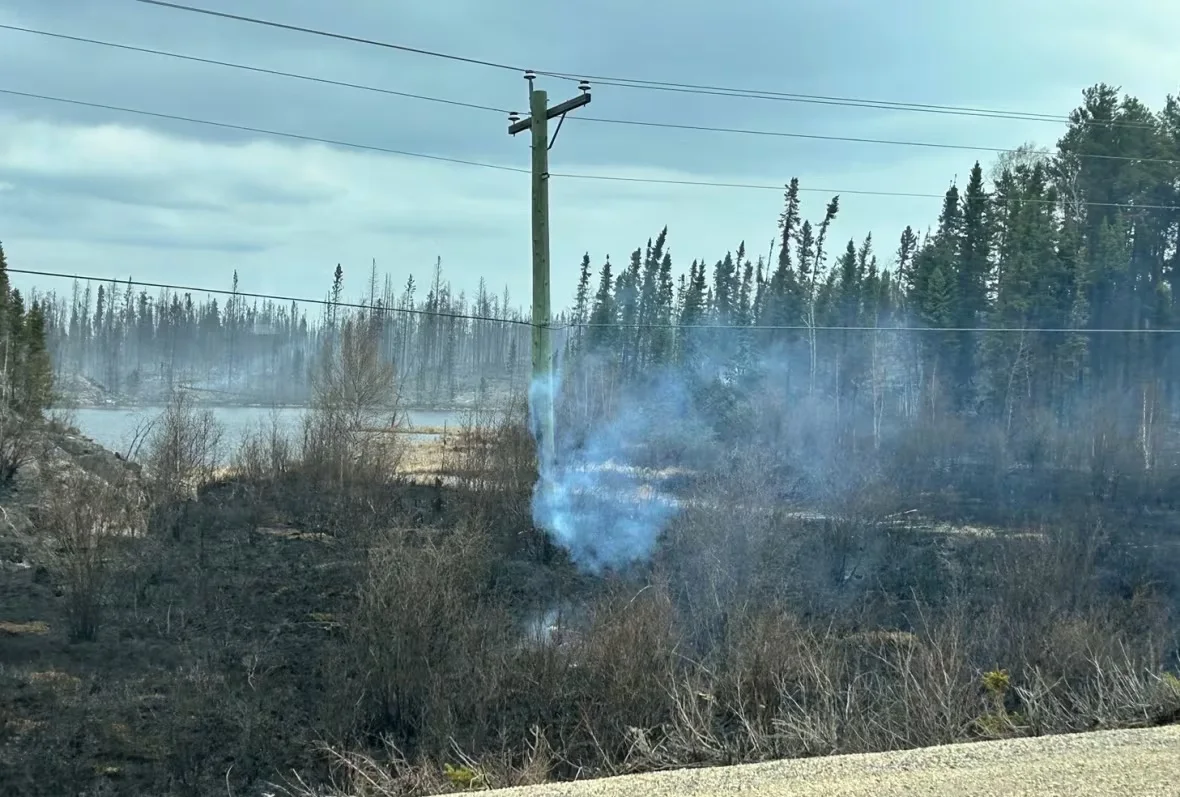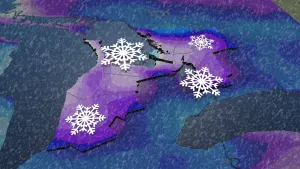
Wildfire that forced evacuation of Cranberry Portage could take weeks to put out
A wildfire that's threatening the northwestern Manitoba community of Cranberry Portage hasn't gotten bigger, but first responders could still be fighting it weeks from now, a provincial wildfire official said.
The entire population of just over 600 people evacuated Saturday as a massive blaze marched toward the community, devouring trees on thousands of hectares of land.
Earl Simmons, the director of the Manitoba Wildfire Service, said the fire hasn't moved or gotten smaller. Though the province said Sunday it was about 35,000 hectares in size, it is actually about 31,500 hectares (or 77,838 acres), after subtracting the space that bodies of water take up.
It's about 1.5 kilometres away from Cranberry Portage.
LEARN MORE: Visit The Weather Network's wildfire hub for all wildfire updates across Canada
"We could be fighting that fire a month from now," Simmons told reporters outside his department's office on Monday afternoon.
The fire was moving at "unbelievable" speed, Simmons said — it was swallowing up land at a rate of about two kilometres an hour at the front of the fire, and about one kilometre an hour on the sides. At times, flames were travelling against the wind, but the fire still raged.
In his 40 years of experience with wildfires, Simmons has "never seen a fire move like this fire moved," thanks to high winds and extremely dry conditions in the area.
"Usually this time of year, the soil is fairly moist, and the fire will whip over the surface. Unfortunately, because we're in a drought situation, fires burn down deep," he said.
"That requires a lot of work to extinguish."
It also meant crews couldn't fight the fire from the front, and they instead resorted to dropping water bombers to try to protect homes and infrastructure.
"Water bombers don't put out fires. Water bombers will help us protect some assets and also give us a chance to put some crews in," said Simmons.

Neena Lundie took this photo of the smoke- and fire-filled sky above the Highway 10 route out of Cranberry Portage on the weekend. (Submitted by Neena Lundie via CBC)
Though the wildfire situation is not getting better, the fact that it's also not getting worse is a small victory for Lori Forbes, the municipal emergency co-ordinator for the region.
"But things can change as we well know. On Saturday, things changed in minutes," Lori Forbes told CBC Manitoba Information Radio host Marcy Markusa on Monday morning ahead of the Simmons' update.
Videos posted by residents on social media sites show smoke-choked sky and tall columns of flames pushing toward the road, consuming trees as ash and sparks fly.
"Insane, unimaginable," is how Forbes described the scenario as people fled.
The majority of people have gone south to The Pas but others headed to different communities in the province as well as Saskatchewan and even Alberta.
"We've pretty much filled up The Pas, Swan River, probably all the way down to Dauphin. But everyone's safe, which is our priority," Forbes said, speaking to CBC News from The Pas, where a reception centre at the Wescana Inn is registering evacuees and arranging accommodations.
RELATED: Massive out-of-control wildfire near Flin Flon forces evacuations
"It's absolute terror, but we try to focus on the fact that you're safe. You're here."
Debbie Asham grabbed some clothes, but that was about it, before she dashed from her home to drive to The Pas.
"Oh, it happened quick. We were on a two-hour evacuation notice and then it turned to 10 minutes. Next thing you know the police are outside saying, 'You need to leave,' so that's what we did," she said Monday while sitting in the Wescana Inn reception area.
"We kind of expected something to happen because of the winter and how little snow we had, but it was too fast."
The blaze, first detected on Thursday, is believed to have been started by lightning strikes. About 50 firefighters are at the wildfire now, and another 55 are coming in from outside Manitoba bother Monday and Tuesday, Simmons said.
Cranberry Portage is about 585 kilometres northwest of Winnipeg, near the Saskatchewan border. It's along Highway 10, which links it to Flin Flon, about 40 kilometres to the northwest, and The Pas, 80 kilometres south.
"The only folks that are in that community now are the wildfire services [personnel] that are still monitoring … all of the homes [and] the structures," Forbes said about Cranberry Portage.
WATCH: How wildfire movements are monitored by the experts
Larry Smerch watched the black smoke through the morning on Saturday while he packed a camper in case he had to leave.
Despite that, in the suddenness of the evacuation order, he forgot his suitcase full of clothes.
"It was scary, but we've had to do it once before. Cranberry weathered that one as well, so I'm hoping," he said, listing a number of belongings left behind.
"And a lot of things we've collected over the years," he said, then abruptly stopped to hold back a cry. "My wife passed away about a year and a half ago, so when I start talking about collectibles, I just thought about her."
The couple lived together "in a beautiful place" on the lake for close to 45 years, he said.
The thought of losing the house and belongings is painful, but it's only "stuff," he said.
"I think the most important things in life are friends."
RELATED: Best practices to keep yourself safe from wildfire smoke
Strong northerly winds on Sunday pushed the smoke hundreds of kilometres south in Manitoba, creating air quality warnings well into Winnipeg. As of Monday, there are air quality statements only for the region around the fires.
"You can definitely smell fire, but depending on the wind, the smoke is actually not terrible this morning," Forbes said about the conditions in The Pas. "But I'm sure that will change as the day changes."
Highway 10 from Bakers Narrows to Highway 39 reopened as of Monday afternoon, only to close again hours later. The Sherridon access road at the junction of Highway 10 is closed as well, according to Manitoba 511.
Officials are hoping to get the road to Sherridon open soon, said Simmons.
The wildfire has also caused intermittent power outages, with Manitoba Hydro's outage map showing just under 800 people affected by outages in the area of Cranberry Portage and nearby Bakers Narrows as of Monday. Simmons said power has since been restored to Bakers Narrows.
About 30 more firefighting crew members from Winnipeg and Brandon are on the way to bolster the forces, said an update Monday morning posted by the rural municipality of Kelsey. They are expected in The Pas by Monday evening.
Cranberry Portage firefighters have also put up several sprinklers throughout the community.
Forbes said she speaks regularly with the RCMP and provides their information to evacuees through social media posts and on the RM of Kelsey website.
"It's very stressful. It's very emotional. It comes in anger. It comes in sadness," she said about the emotions of those forced out.

A Manitoba Hydro pole near Cranberry Portage burns. Just under 800 people are impacted by power outages in the area and nearby Bakers Narrows as of Monday. (Submitted by Manitoba Hydro)
Mental health and some primary health-care workers have been at the reception centre in The Pas periodically during the day for anyone that needs extra support, she said.
The wildfire is not yet threatening Flin Flon but it has impacted the city of about 5,000 people. The telecommunications system has been severed, cutting cellphone service and internet access.
"The odd landline is working, but even they aren't all working. My landline at home is not working and that used to be our failsafe," Flin Flon Mayor George Fontaine told CBC Manitoba Radio Noon host Janet Stewart on Monday.
"Were we prepared for this scenario? No, it never occurred to us."
In the meantime, the city has created a patchwork of communications using the Starlink satellite system to access the internet as much as possible.
The most reliable way for residents to get information at the moment is to listen to the radio, Fontaine said, "because we can't count on anything else right now."
"As we're [being] told right now, we're in no imminent danger, but you know, we can't control the winds. We're going to have to watch and see how this goes and hopefully, hopefully it goes in our favour."
This article, written by Darren Bernhardt and Rachel Ferstl, was originally published for CBC News. It contains files from Brittany Greenslade.








